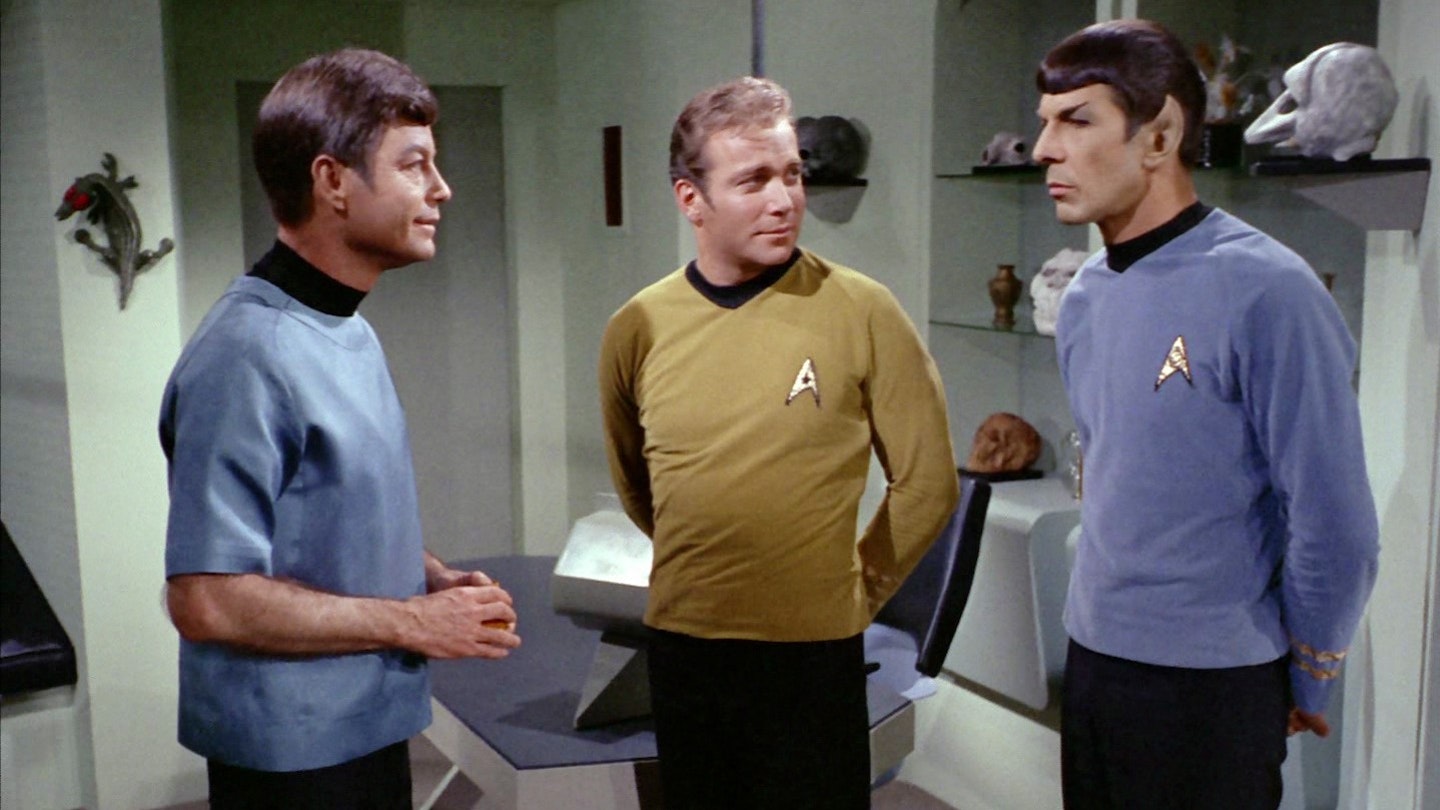Star Trek is a pop culture phenomena that continues to live long and prosper after five decades of boldly going. Some are obsessed by it, others perplexed. For decades, critics and fans have attempted to dissect the unique alchemy that has insured the franchise’s enduring popularity as well as understand the man who created it, Gene Roddenberry. In this exclusive excerpt from volume one of The Fifty Year Mission: The Complete, Uncensored, Unauthorized Oral History Of Star Trek, co-written by Empire Online's Ed Gross and Mark A. Altman, a few of those reasons are offered.
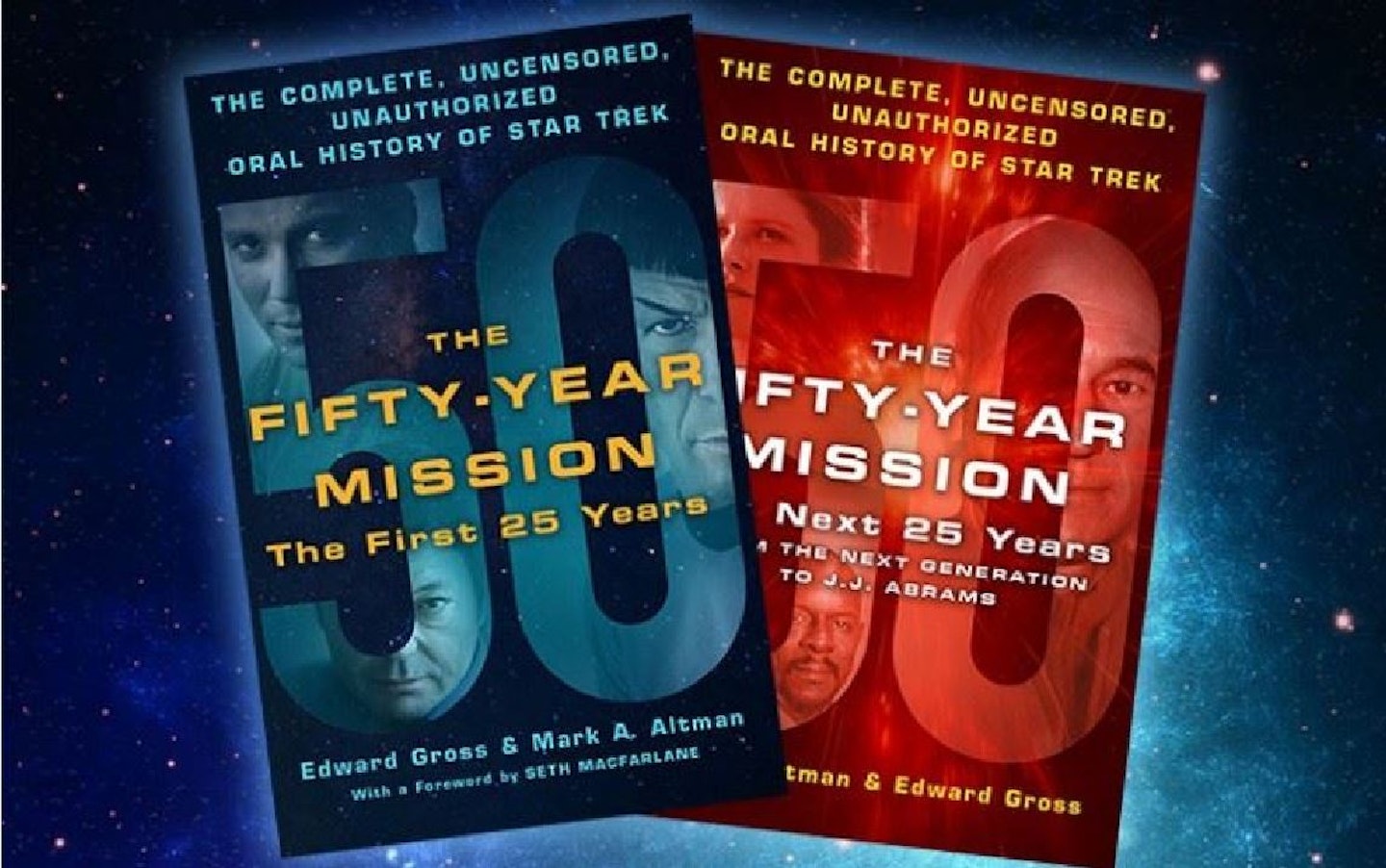
Gene Roddenberry (creator, Star Trek): "Trek" means walking, voyaging. And the name Star Trek really means voyaging from star to star. I knew it was the right title because when I first mentioned it to the network executives, they said, "We don't like it."
Ira Steven Behr (executive producer, Star Trek: Deep Space Nine): The theory I’ve always heard says that when the western died, science fiction filled the gap. We could not dream in the past anymore, so we started to dream in the future.
David A. Goodman (consulting producer, Star Trek: Enterprise): Star Trek wasn’t a big hit in the '60s when it came out, but it hit in the '70s when there was this malaise and lack of trust in government. But you had this iconic American hero at the center of it, and he’s surrounded by an international group. It really spoke to America as this great thing. For the British, James Bond is sort of patriotic. There’s a way in which Star Trek is the same thing for America.
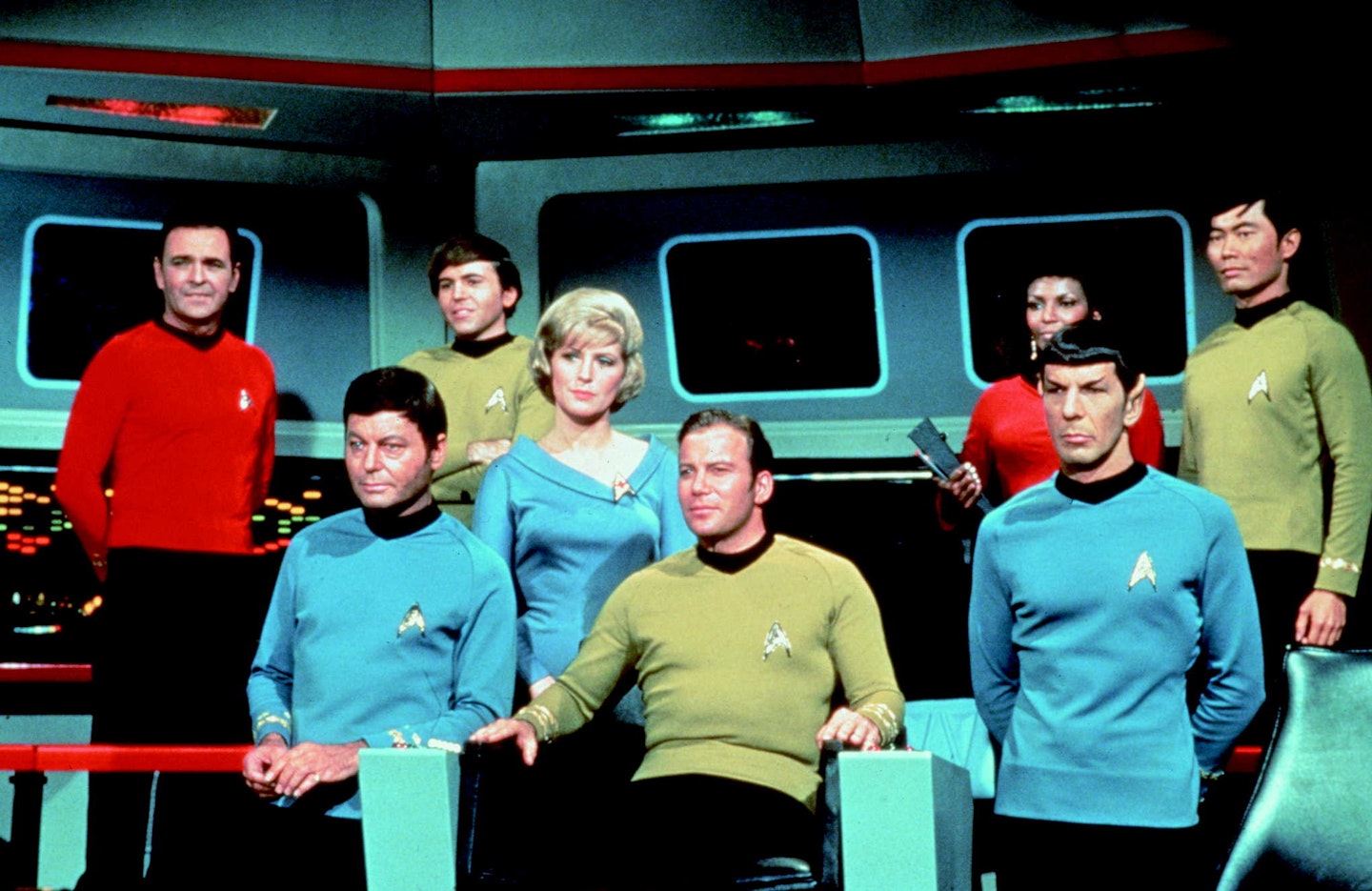
Thomas Doherty (professor of American Studies, Brandeis University): The show is sort of both modest enough to respect the indigenous aliens of off-worlds, but at the same time, we know in the end we have to show them how to do things and our values are better. It has the arrogance of American exceptionalism even though we say we have the non-interference prime directive, but basically we’re going into these places and showing them “how to live right,” which is very American, too.
Jonathan Larsen (executive producer, MSNBC): The image we have of Star Trek’s politics changes with our own politics. It can be tricky trying to divine the political ideology of Trek’s creators and writers from the plotlines and story resolutions and the tics and arcs of individual characters. Yes, “James Tiberius Kirk” reads an awful lot like an analogue of “John Fitzgerald Kennedy.”
Michael Piller (executive producer, Star Trek: The Next Generation): The early Star Trek, original recipe, was a very Kennedy-esque sort of mission to save the universe. Let's get these guys out there and show them what democracy is and educate… and if they don't do it the way we want to, we'll hit a few and line them up and get them the way we want them.
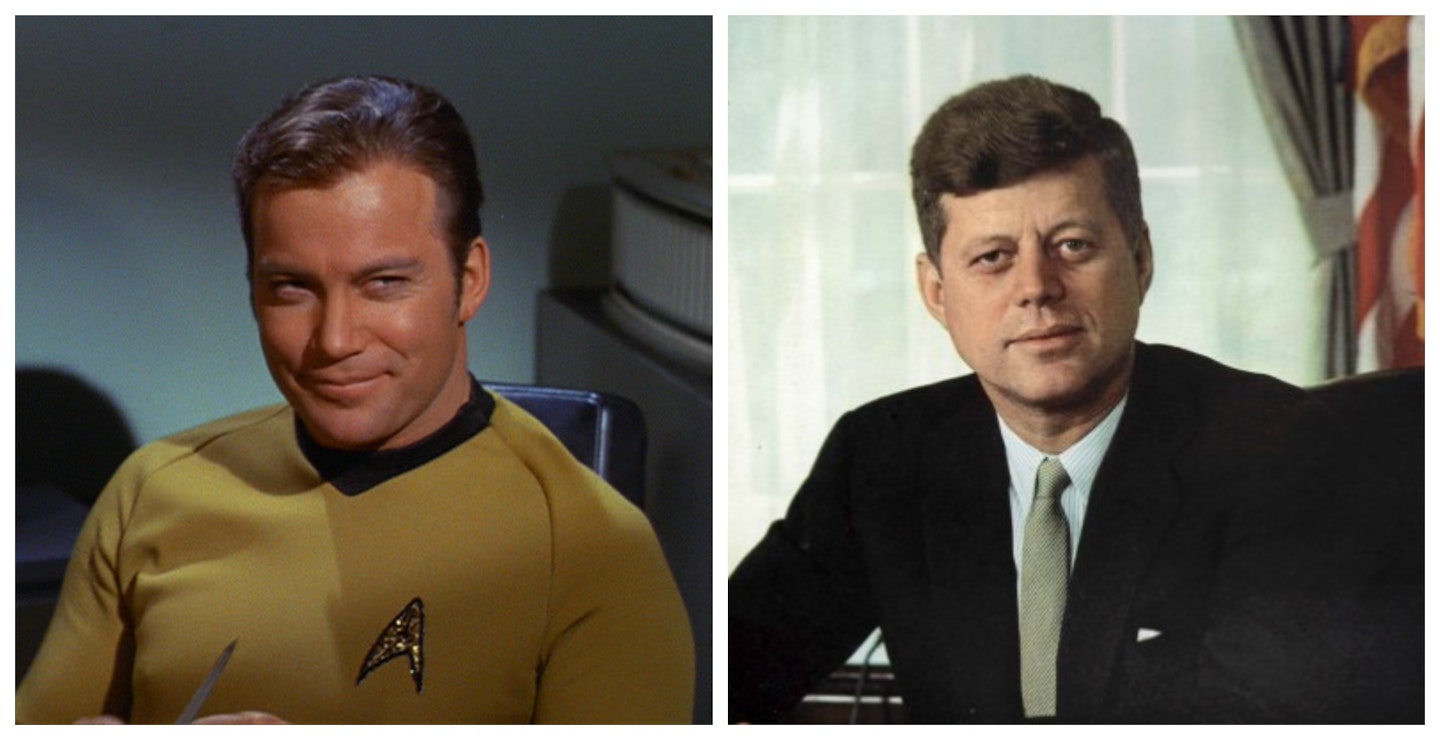
Larsen: Kennedy saw the exploration of space as an obligation, not necessarily in pursuit of a goal, but because he recognized space exploration as the inevitable next step if our society was to remain forward-looking and forward-moving. Similarly, Kennedy had little interest in looking back, in honoring old grudges and historical enmity.
Brannon Braga (executive producer/co-creator, Star Trek: Enterprise): There was something ineffable running through them all, which was Gene Rodenberry’s philosophy. And whether or not people were aware of Star Trek’s appeal because it presented a utopian future, what I think was critical to its appeal is that it’s a universe where everyone has a place, no matter how weird or perhaps even disabled you are. Even if you’re blind, you have a role, and that’s attracted a lot of people.
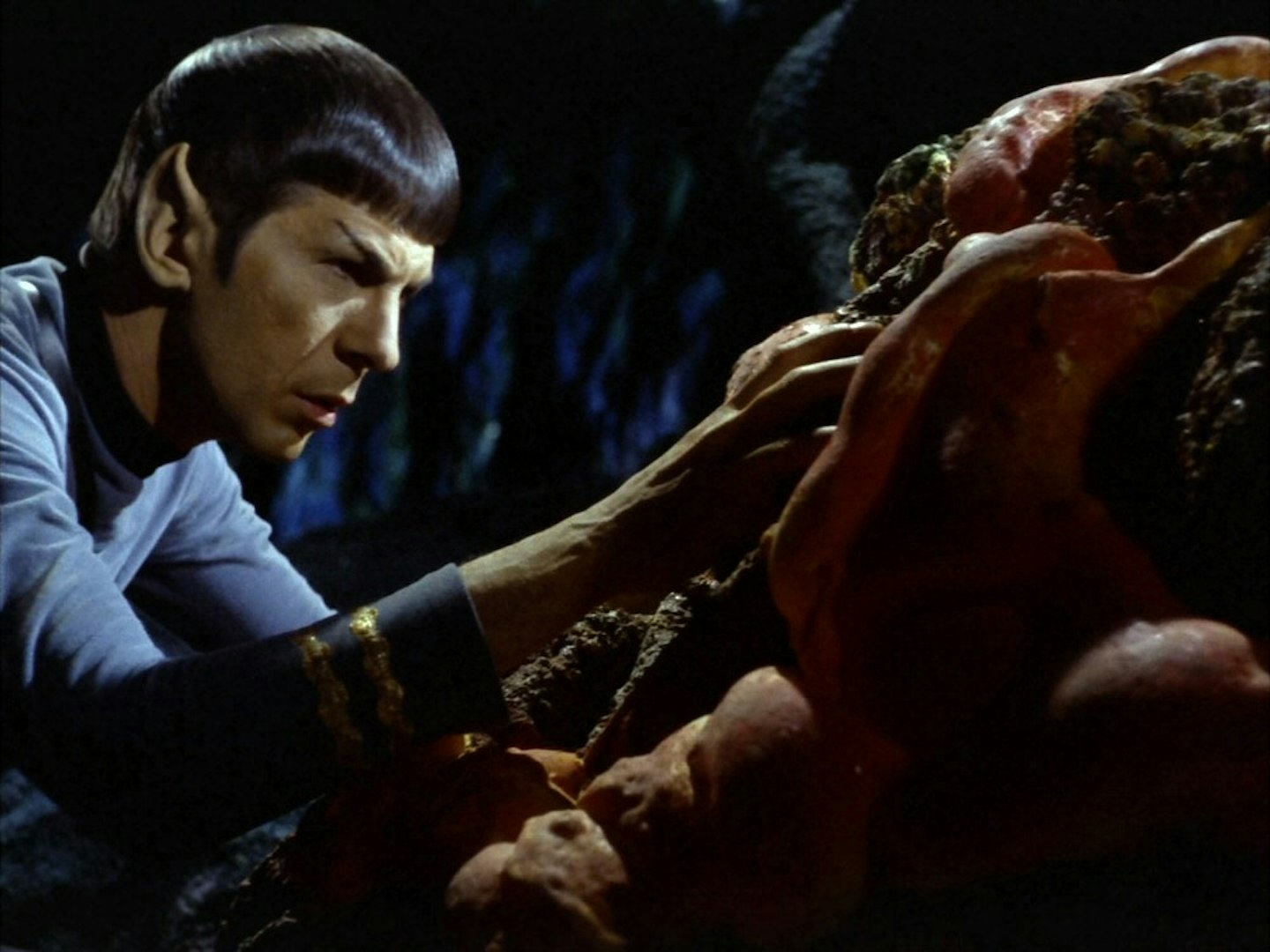
Larsen: Consider how jaw-droppingly radical and likely unacceptable the resolution of “The Devil In The Dark” would be today. The rock-like monster slaughters miners relentlessly. What is its punishment? A business deal. A contract to work with those miners it did not kill. There is no retribution. There is no vengeance. Moreover, denying the emotional need for retribution is portrayed not as weakness, but as manly maturity. It’s virtually impossible to imagine mainstream fiction in the post-Reagan, let alone post-9/11, era forswearing a violently punitive ending to a story such as this. But that was what mature, realistic, clear-headed, albeit idealized, government looked like back then. Mature leadership meant becoming the generation that finally severed the self-regenerating legacies of violence.
Rod Roddenberry (son of Gene Roddenberry): It’s based on the idea of IDIC, which was one of the backbones of the original series. It’s the philosophy that’s always really kind of resonated with me. I did not grow up watching Star Trek. I liked Knight Rider and The Dukes Of Hazzard. It wasn’t until later in life, through the fans, that I got a different perspective of what Star Trek was and then I went back and I’d start to get it. We all know the phrase “IDIC”, which means Infinite Diversity In Infinite Combinations. It’s the idea that it’s universal acceptance.
Bryan Fuller (executive producer, Star Trek 2017): The Munsters and Star Trek were kind of the shows I would watch when I got home from school. They both had a lot to do with creatures and also being inclusive worlds in a way. The Munster family was very much an inclusive world; they allowed any kind of freak flag to fly. And we learned that in Star Trek there is an entire universe out there of different varieties of people – and all of them are okay. It was an early lesson in inclusivity. I was living in a household where my dad didn't want me to watch The Jeffersons because it had black people in it. It was that level of kind of small town 70's suburban racism.
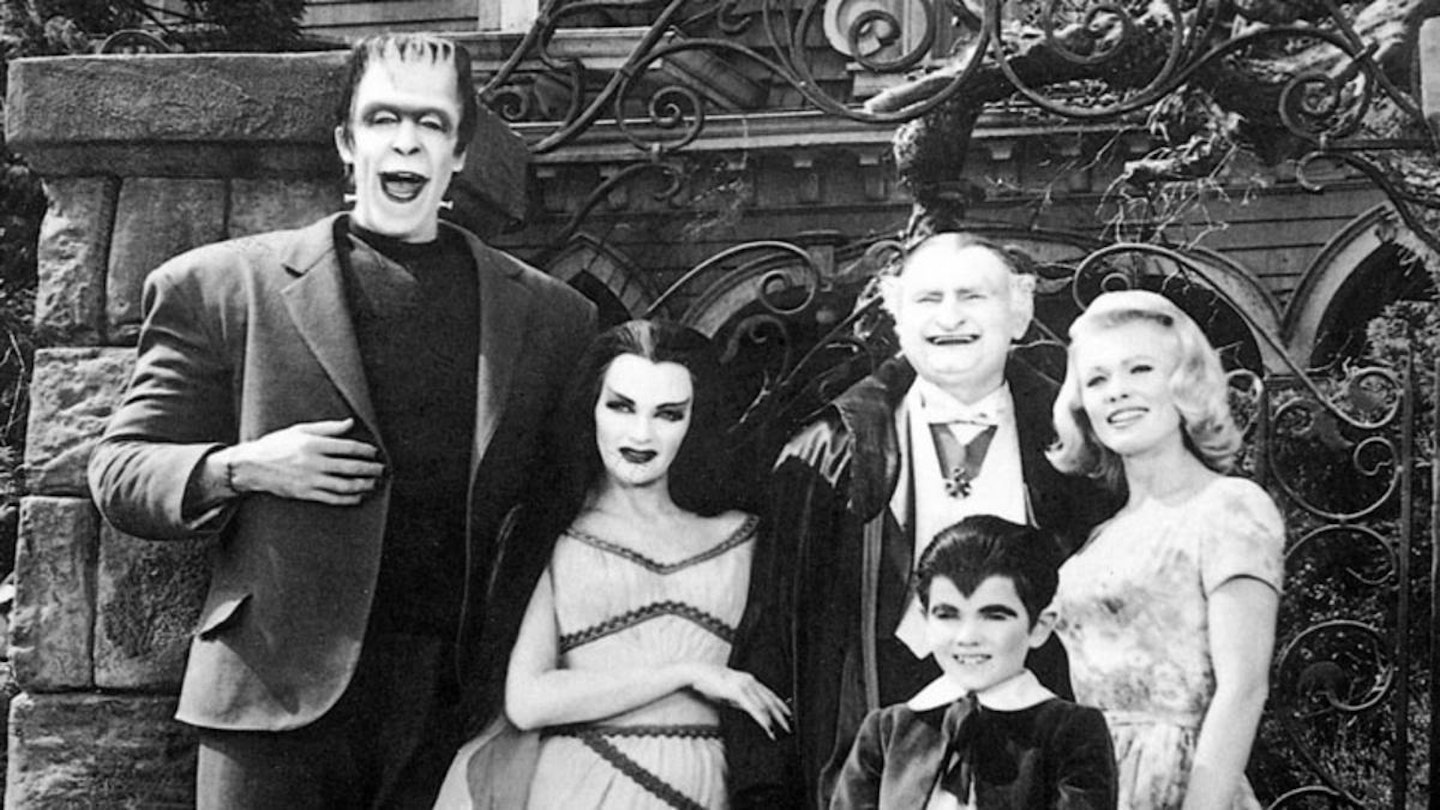
Scott Mantz (film critic, Access Hollywood): Star Trek was at its finest when it was a morality play. It took decades for me to draw the correlation between “This Side Of Paradise” and The Summer of Love. But of course, even as a kid, I knew that “Mudd’s Women” was about space hookers.
Goodman: I think that the multiculturalism was great because of the time; you had an African American, an Asian, and this fake Russian on the bridge of the Enterprise, but the white American guy was still in charge. Then you go to Next Generation. The White European guy, still in charge. It gets better with Deep Space Nine and Voyager, but unfortunately, because it’s the business of television, the white guy is still in charge.
Braga: You've got to put it in historical context, though. What seems backward today may be groundbreaking in its time. And it’s incremental. You have to give Star Trek its due.
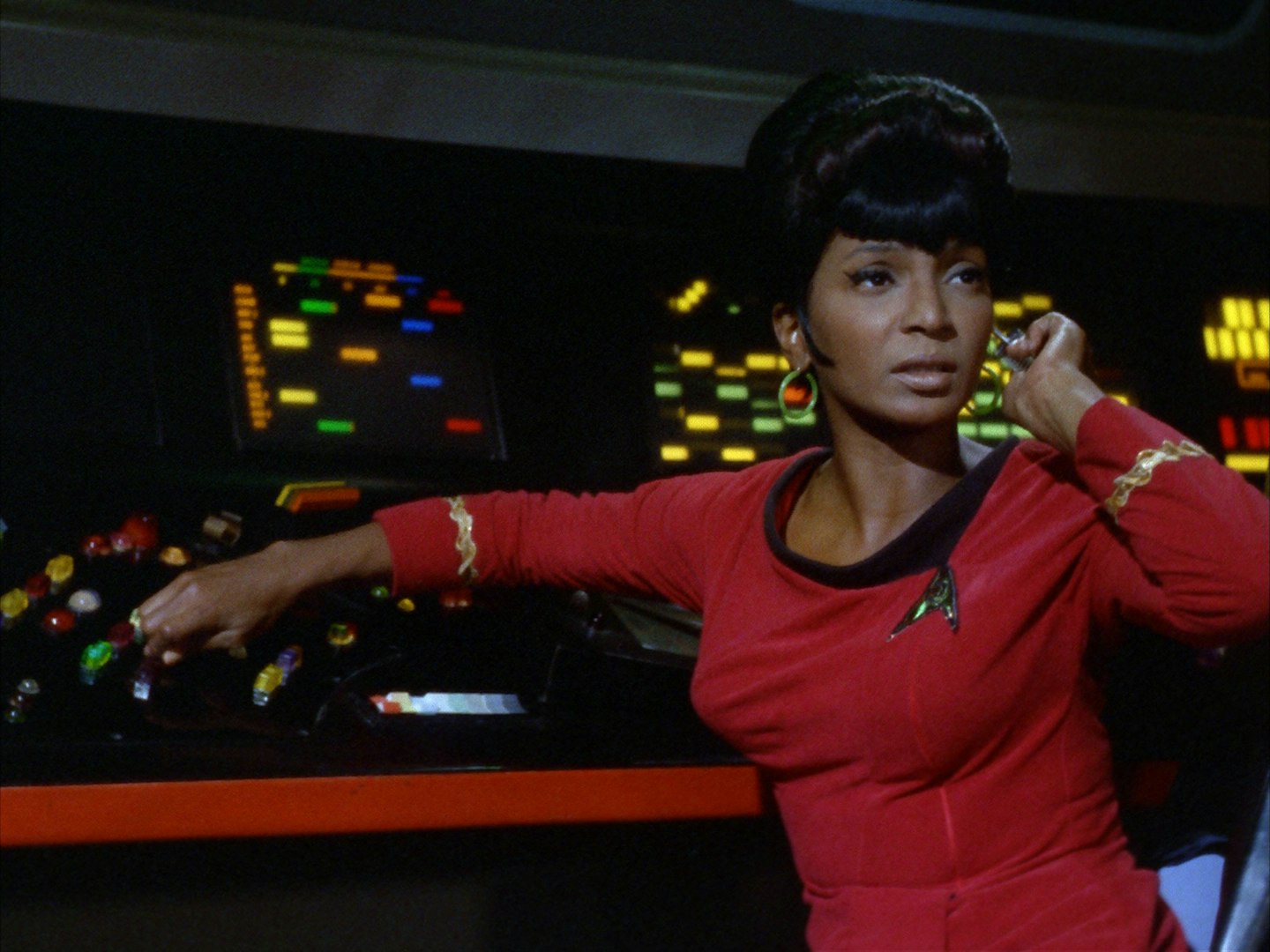
Rod Roddenberry: There was a great quote that D.C. Fontana said about Nichelle Nichols and having a black officer on the bridge and what my father said to that. Apparently, he would get letters from the TV stations in the South saying they won’t show Star Trek because there is a black officer and he’d say, “Fuck off then.”
Chris Pratt (actor, Guardians Of The Galaxy, Jurassic World): It was so progressive. It had all kinds of different races and various male and female characters from different alien races all around in power, in relationships with each other at a time when that wasn't cool, you know? It was very progressive.
Larsen: It’s interesting that no matter how sophisticated or advanced we imagine some work of fiction to be, the years almost always seem to reveal some element that was awkwardly, embarrassingly backward. Many early cartoons had their moments of racism in both the depiction of people of color and the lack thereof. And Star Trek had its moments in that regard, too.
But its worst, most well documented flaw can be found embodied in the output of the wardrobe department, courtesy of Mr. Rodenberry: the skirts. Maybe the creators of Star Trek believed that a true portrayal of an utterly gender-equal, let alone non-ageist, future would not fly on commercial television in the 1960s. So they did as much as they could — giving women, albeit short in years and hem lines, “real” jobs and occasionally real authority. One would hope this was the case, given that the creators themselves were not all men.
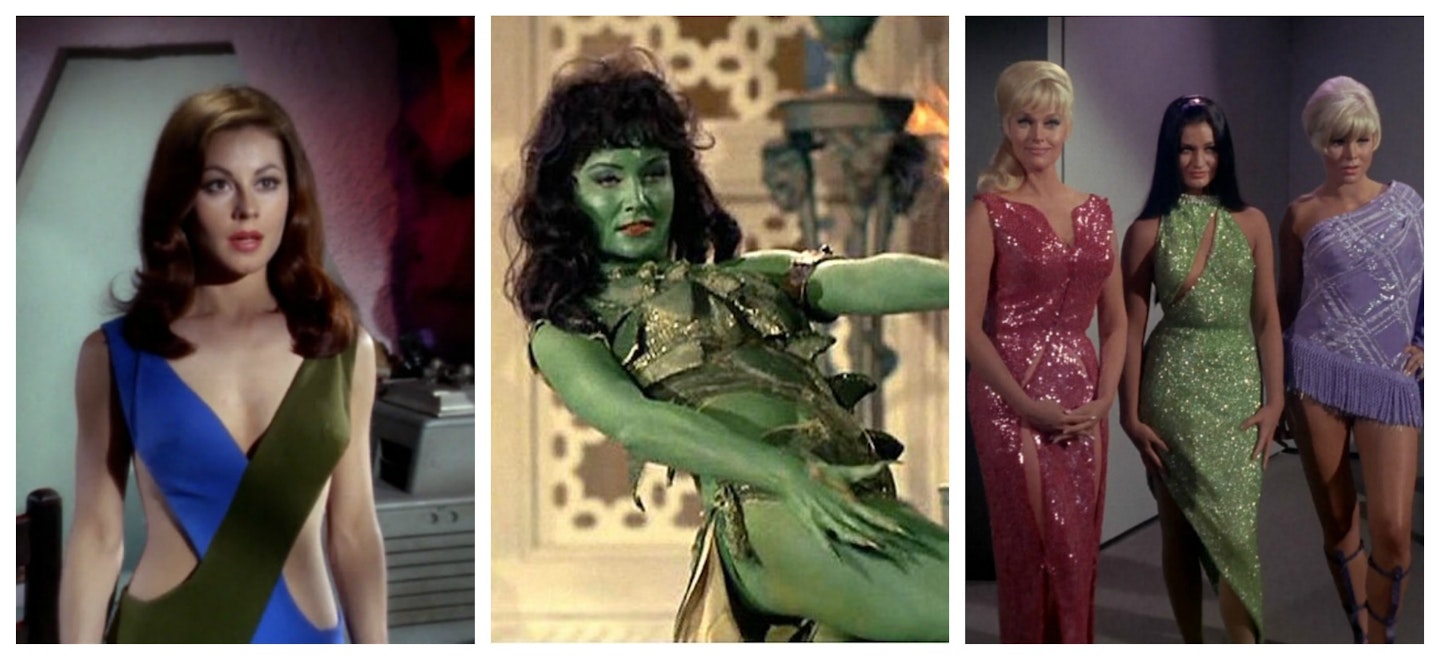
Either way, the extent of gender-equality that Star Trek did muster paved the way for public acceptance not just of future female Federation captains…but actual, real-life female astronauts, too. As in so many other regards, even when it came to elements of our politics and our culture, in imagining our future, Star Trek made it possible.
Gene Roddenberry: Star Trek will always work as long as you have imagination. We have never had anyone in Trek who wasn’t into growth. During my first Trek, for instance, I didn’t pay any attention to women. In the years I have grown into something of a strong feminist. I was the product of a southern family background. My parents never spoke of any race with contempt. They encouraged me to try strange ideas and philosophies.
Ed Naha (producer, Inside Star Trek LP): The Star Trek approach to life is all-inclusive and positive. When the TV show first was aired, the politics of America was anything but. It was a time of war, protests, race riots and brutality – but also a time when a counter culture was emerging. The original show was sort of an intellectual and emotional refuge for people who believed in positive change. And cleavage.
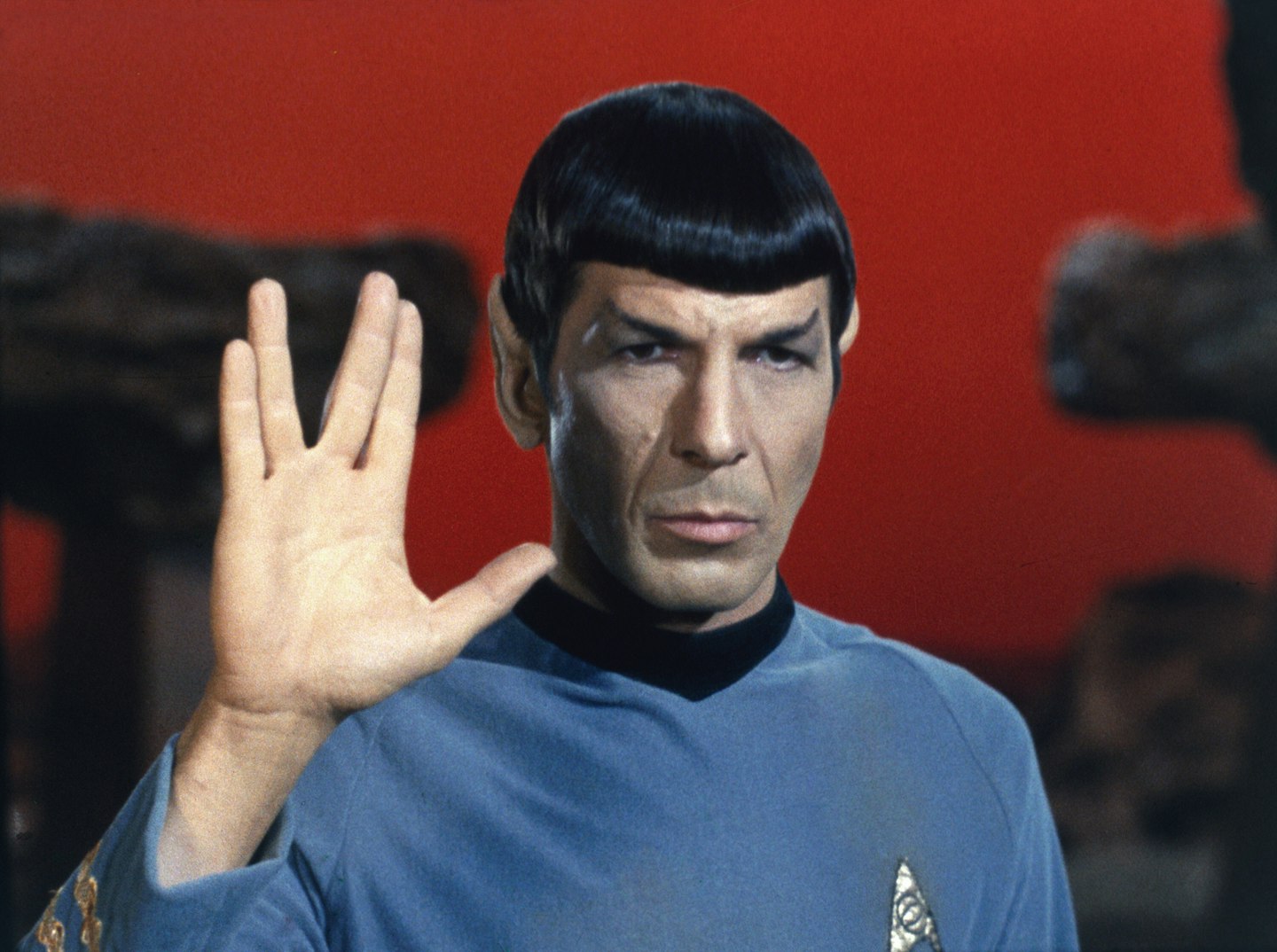
Leonard Nimoy (actor, "Mr. Spock"): One of the large questions we have been asked time and time again is what is giving this thing its longevity? Why does it continue to survive, to touch people, to intrigue? I think one of the major reasons is that the whole structure of Trek is a moral one – it’s a moral society that people are attracted to. It really is a meritocracy. If you do well, you advance. If you are good at what you do, you can have the job. It doesn’t matter who you are or what you are, what your origins are, your color or race. None of that matters. We need to get jobs done here, and if we have someone who can do the job, they have the job. Audiences recognize that. There’s a rightness about that. There’s a correctness; not a political correctness, about a meritocracy where performances is valued, where the reality of the truth is recognized and valued. Where things are right because they are right, and because we need them to be right.
We had our flaws. We had certain political flaws, a certain kind of righteousness, to a degree, that come from the humans that were making these shows. But given that, there is still a moral structure within Star Trek that makes sense.
Marie Jacquemetton (story editor, Star Trek: Enterprise): The fact that it was conceivable that man could go to another planet or even moonwalk was incredible. I had a scrapbook like all kids from my generation do of every astronaut and what they were doing. To our kids, James Cameron is what space is; Alien and Battlestar Galactica. It’s almost like a movie, it’s not even a real thing. They would not think of becoming an astronaut and going into space. It’s not even part of their concept of what the future is. Everything’s turned into the Internet. It’s all about being famous for a second and how can I get noticed. There’s no sort of awareness of what’s out there beyond our little bubble. And when we were kids I think what was so exciting about Star Trek was the “what if” possibilities.
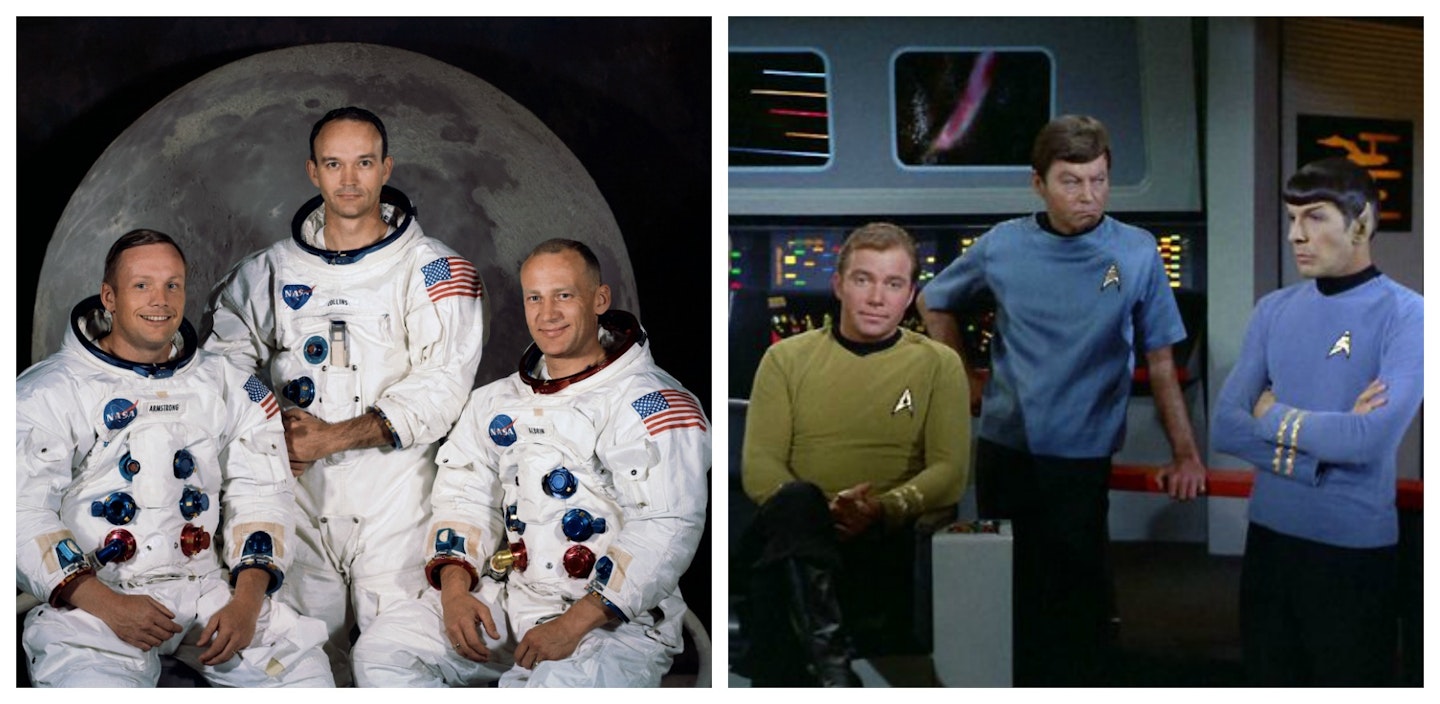
Ronald D. Moore (co-executive producer, Star Trek: Deep Space Nine): I sort of discovered Trek because I was into the Apollo space program as a kid. I had seen the original moon landing and I was really taken with the space program, and that led me to Star Trek. Lost In Space was the first sort of space show that I fell in love with, and then I started seeing Star Trek and that became the show for me. It was on five days a week at 4 in the afternoon and after I got home from school I could watch Star Trek everyday. I saw it as where NASA was going someday and where we could all go someday. I read it as a prophetic show, that this was what was going to happen. I remember thinking, “When are we going to have a one world government and start building starships?”
Dean Devlin (writer/producer Independence Day, Stargate): My mother played a role in the “Wolf In The Fold” episode of Star Trek. It's a terrific episode with murder, intrigue and spirits! But what I most remember about it was that they gave my mother a phaser to take home. I was a little boy at the time and my mom brought me an actual phaser from the TV show to play with. This was my "crack" that started my addiction to science fiction.
Rene Echevarria (supervising producer, Star Trek: Deep Space Nine): My first memory of Star Trek is it being on the air… and being sent to bed. I remember hearing the theme song and seeing a spaceship unlike anything I had ever seen before. And it was 9 o’clock on a Friday night and being told it was bedtime. I was six years old or something. Space was happening. Man was going to the moon. So for me, Star Trek is just woven right into that part of American history.
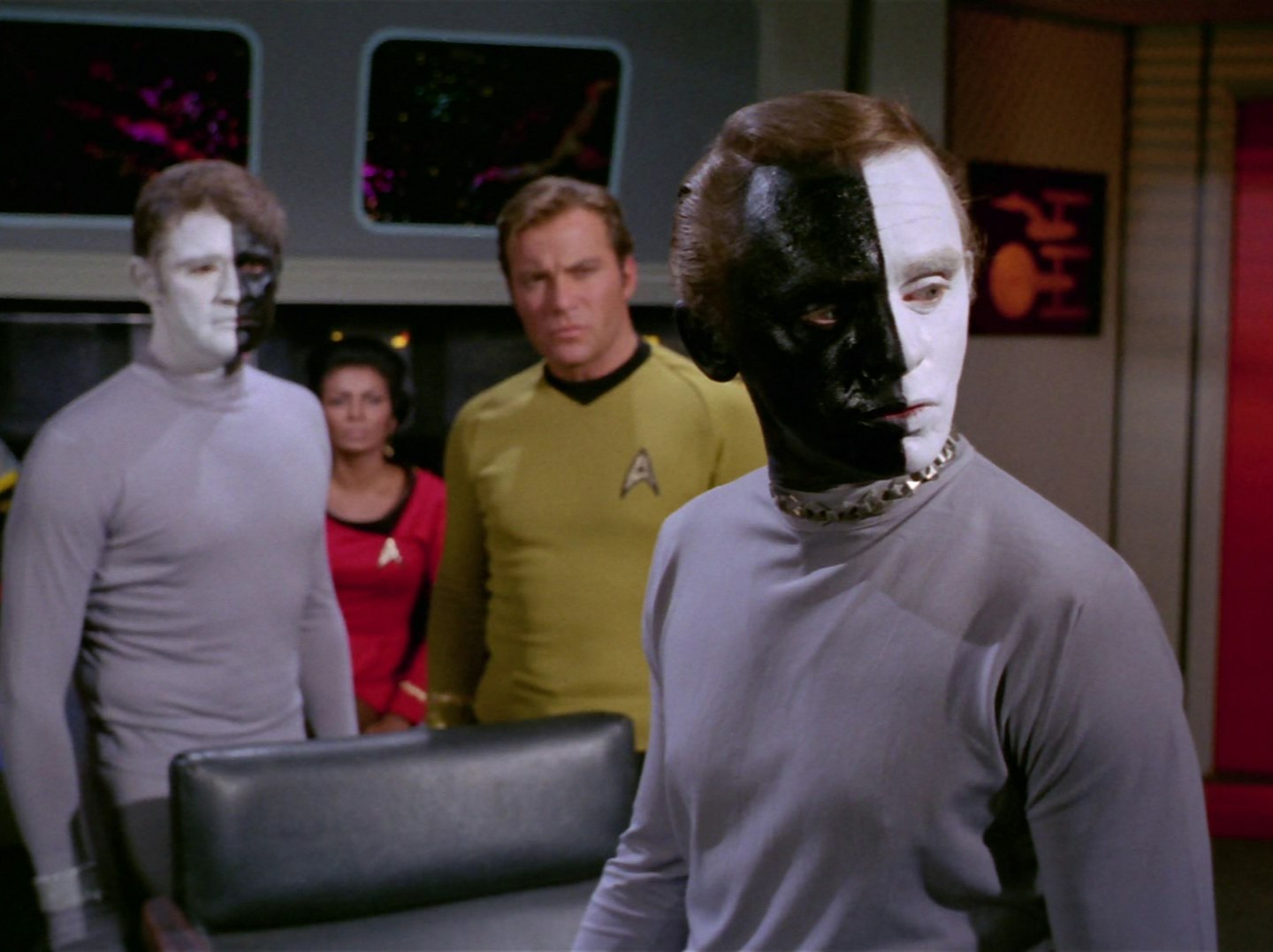
Larsen: I wanted a show that I could watch with my seven-year-old son, Jeremy, that would be fun and exciting, but also open doors for us to have conversations about ethics and big ideas. Important ideas. So we decided to watch the entire original series, in order. I went with unremastered, in part, because I didn’t want spiffy special effects to take center stage. If special effects weren’t the main appeal, I thought Jeremy would focus more on the characters and their motivations and the underlying dynamics of each story. That said, Jeremy loved the aliens and the monsters and the spaceships.
But more than that, he came to know the characters — we argued over which were coolest — and when I’d pause the shows to explain some of the more subtle story elements, we often found ourselves in those big-idea conversations I had hoped for. Jeremy knows at least a bit about World War Two and the Cold War, and mutually assured destruction, and Vietnam and domino theory and on and on, primarily because of our conversations about what elements from our history Star Trek was addressing in individual episodes. We’ve watched lots of other movies and shows — none has opened the door so powerfully or insistently to that kind of exegesis about cultural and historical relevance. I don’t think it’s a coincidence that none has stayed with him as deeply as Star Trek has.
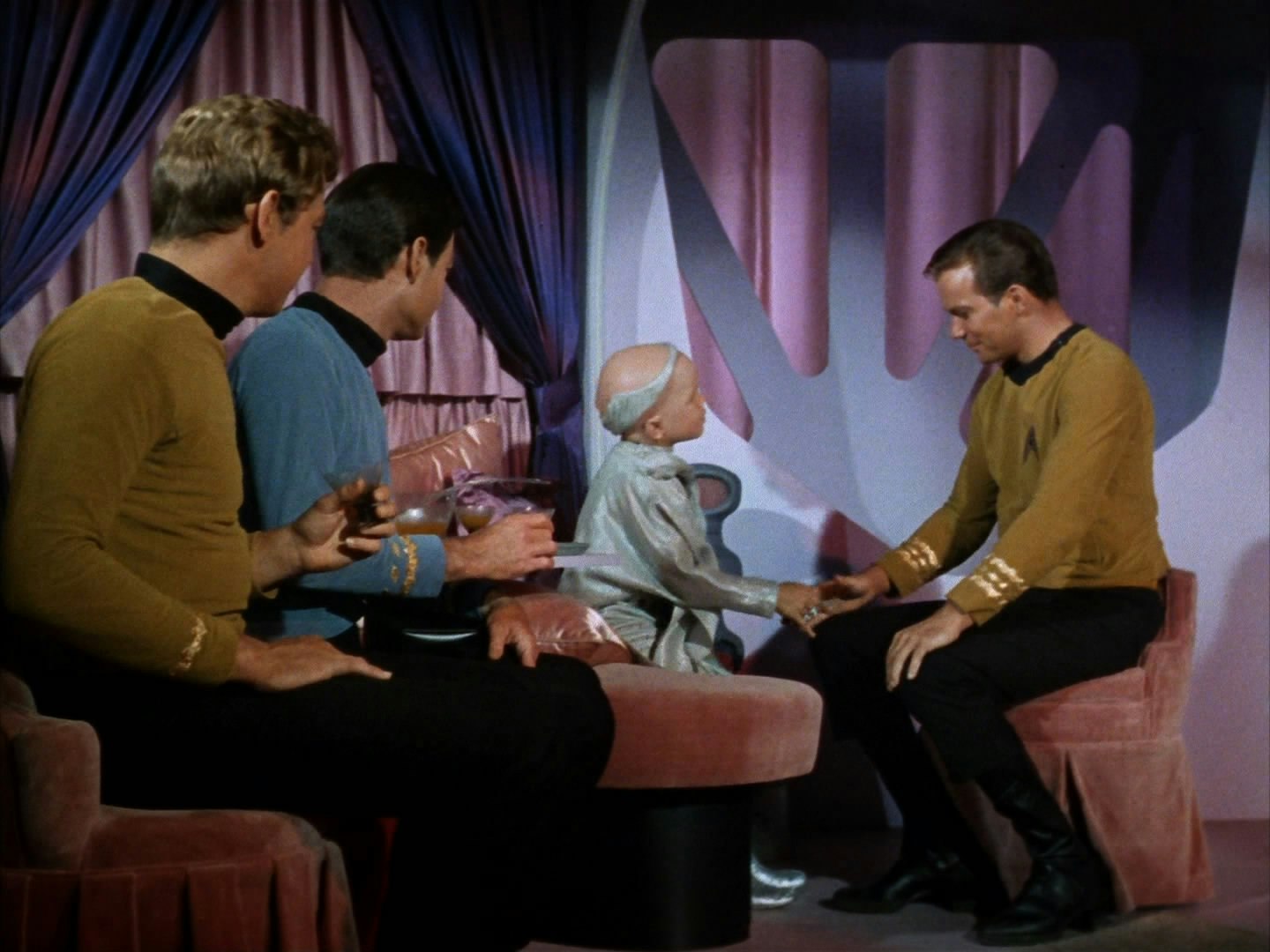
Braga: Star Trek isn’t just a shoot ‘em up laser show. There’s a certain expectation that you’re going to explore some aspect of humanity in an interesting way, which distinguishes this show from most sci-fi series. The different series seem to reflect the time in which they were created to some degree, but there’s always a humanistic, philosophical core that seems unchanged. I would hope that Star Trek would retain its essence going forward.
Robert Lewin (co-producer, Star Trek: The Next Generation): The old series endured because it is basically rooted in two elements. The first element is that the shows have ideas. Some are good, some are not so good. There is philosophy, extravagantly designed ideas with other planets that you can’t express in any other show. Some of the ideas are wild, but they’re always grounded in science fiction reality. The other reason is that the affection the characters felt for each other was, in a sense, the same kind of affection you got in all the long-running series.
Doherty: The show is also about the Freudian triad; the id, the ego and the superego. That’s the core of the series.
Mantz: My love for Star Trek was fueled because of the characters. When I was a kid, I wanted to be James T. Kirk… and I still do.
Goodman: He could kick anybody’s ass.
Mantz: He was the James Bond of outer space.
Echevarria: There are certain actors who just grab a role with such gusto that you can feel it. And Shatner did. He believed. They all did remarkably when you think about the fact they were standing on these sets made of cardboard practically, wearing these costumes and make-up and how outlandish it all was. The way they committed to it was extraordinary. The sort of perceived wisdom is that the show was this quirky show that was cancelled that nobody watched, but Leonard Nimoy was nominated for an Emmy.
Goodman: There is a way in which Kirk is wish fulfillment for a lot of guys, in that he’s obviously an action hero, but he’s also smart. And then his best friend is the super nerd, Spock, and the super nerd can actually beat up the Kirk character, which is also a bit of wish fulfillment. And that’s true going forward as well. Picard is the intellectual leader who leads by the weight of his intellect.
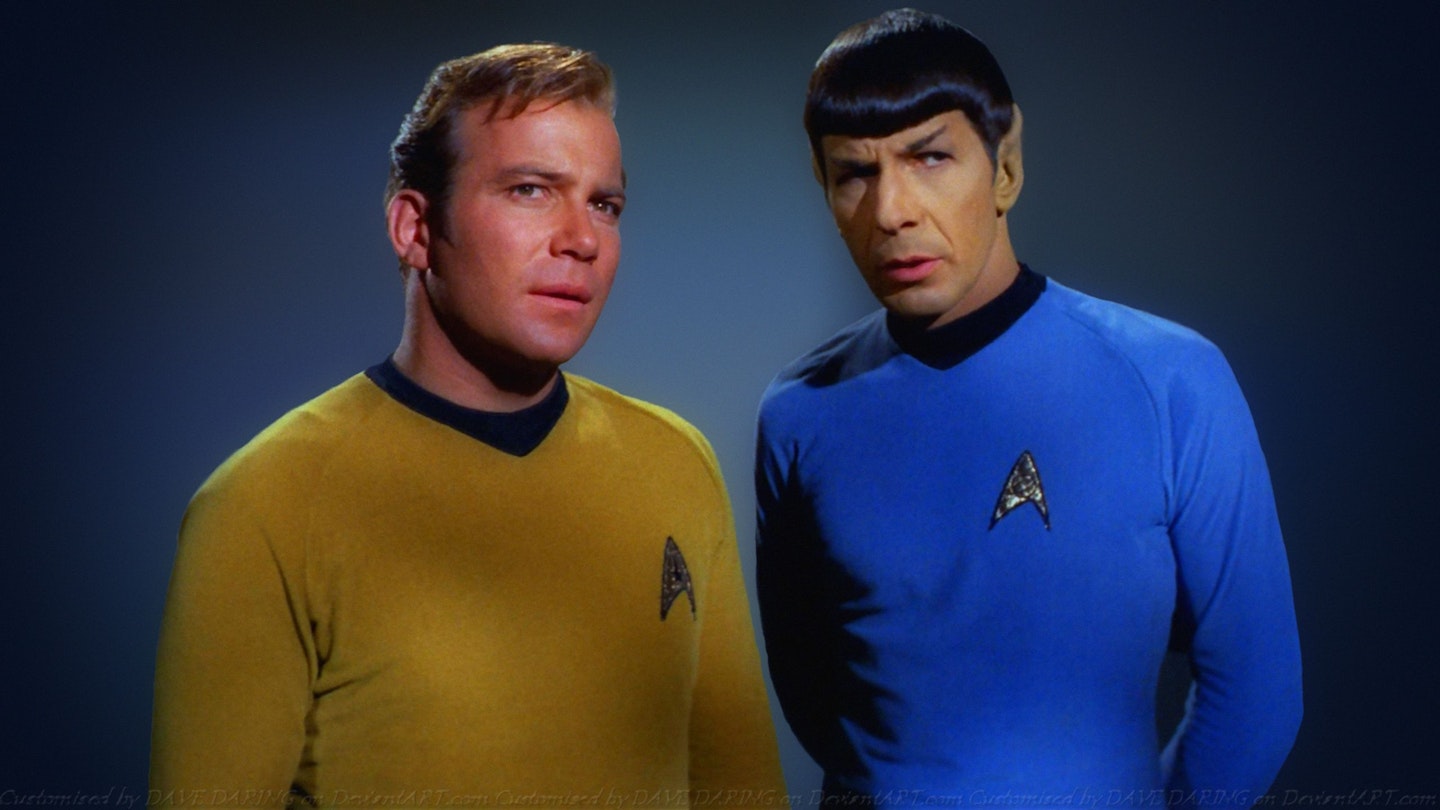
Harve Bennett (executive producer, Star Trek II: The Wrath Of Khan): Leonard was to Star Trek what David McCallum was to The Man From U.N.C.L.E. Bill Shatner is the centerpiece, but the thing that makes it work is this extraordinary oddball who makes the show unpredictable. I’ve always thought that. The fans validated that in Leonard’s first two years on the old series.
Kim Cattrall (actress, "Valeris," Star Trek VI: The Undiscovered Country): I loved the 60’s show. I don’t really have an affinity for The Next Generation. When I was growing up I just thought Spock was the most amazing character. He was so smart and sexy. He was just the perfect man to me, maybe a little lacking in visible passion, but underneath all that was this incredible passion.
Echevarria: For any kid who was into Star Trek, it was did you identify with Kirk or were you a Spock guy? I was a Spock guy. There’s an age when you’re 12 or 13 where logic seems like the answer to all the world’s problems. You’re, like, “I can logic my way to anything.” The idea of logic appeals to the adolescent brain.
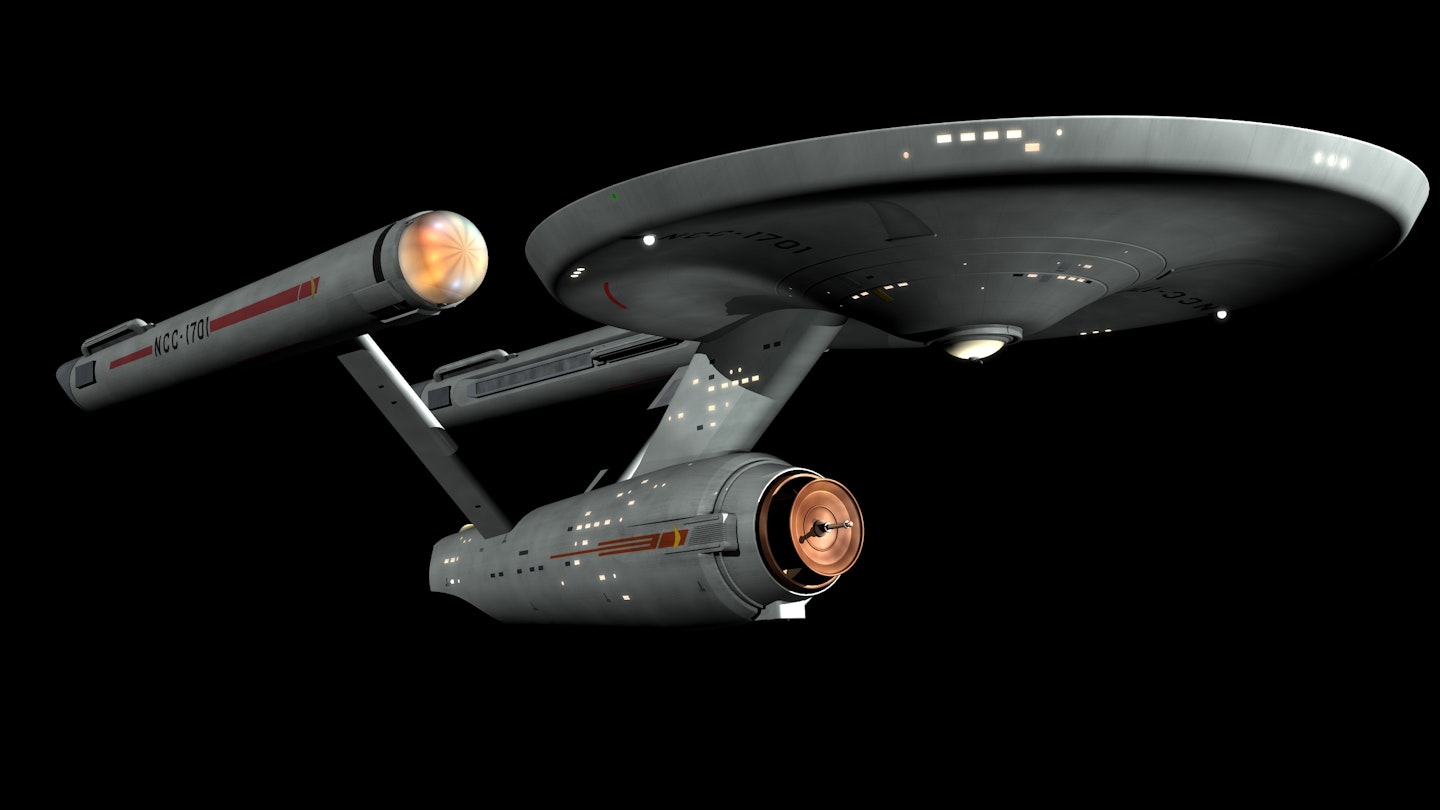
Rod Roddenberry: I didn’t really consider something on television being so deep and I was also a teenager. Things like Motley Crue were what spoke to me. I wasn’t thinking about the future. So it was going to the conventions and just hearing story after story about how it touched people or what their views on it were or how it made humanity a better humanity that interested me.
John D.F. Black (associate Producer, Star Trek):
It’s very easy to look back now and say Gene Roddenberry knew what he was doing. He didn’t know, but the collective knew. [Robert] Justman, myself and other people who were involved with the pieces as they came out. We were a collective “one.” And that one turned out to be in quotes “Gene Roddenberry.” We were all in that mix. It was a wonderful thing to be involved with. Except when you were there... and then it was terrible.
For more information on The Fifty Year Mission, in the UK click here, in Australia click here, and in America click here.
[
